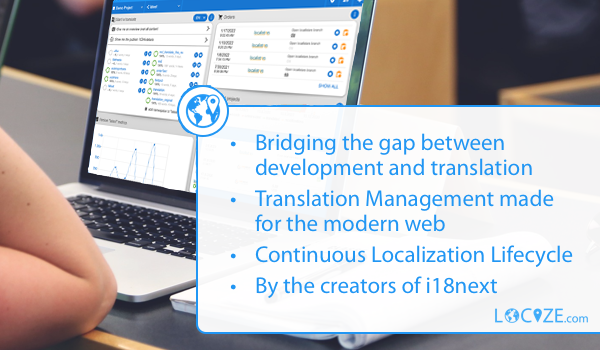Master Branch is the newest version using hooks (>= v10).
$ >=v10.0.0
npm i react-i18nextreact-native: To use hooks within react-native, you must use react-native v0.59.0 or higher
For the legacy version please use the v9.x.x Branch
$ v9.0.10 (legacy)
npm i react-i18next@legacyThe documentation is published on react.i18next.com and PR changes can be supplied here.
The general i18next documentation is published on www.i18next.com and PR changes can be supplied here.
Before: Your react code would have looked something like:
...
<div>Just simple content</div>
<div>
Hello <strong title="this is your name">{name}</strong>, you have {count} unread message(s). <Link to="/msgs">Go to messages</Link>.
</div>
...After: With the trans component just change it to:
...
<div>{t('simpleContent')}</div>
<Trans i18nKey="userMessagesUnread" count={count}>
Hello <strong title={t('nameTitle')}>{{name}}</strong>, you have {{count}} unread message. <Link to="/msgs">Go to messages</Link>.
</Trans>
...Head over to the interactive playground at codesandbox.
- How to properly internationalize a React application using i18next by Adriano Raiano
- I18n with React and i18next via Alligator.io by Danny Hurlburt
- Ultimate Localization of React (Mobx) App with i18next via itnext.io by Viktor Shevchenko
- Internationalization for react done right Using the i18next i18n ecosystem via reactjsexample.com
- How to translate React application with react-i18next via codetain.co by Norbert Suski
- Building i18n with Gatsby via gatsbyjs.org by Samuel Goudie
- Get your react.js application translated with style by Jan Mühlemann
- Translate your expo.io / react-native mobile application by Jan Mühlemann
- You're welcome to share your story...
- Simplicity: no need to change your webpack configuration or add additional babel transpilers, just use create-react-app and go.
- Production ready we know there are more needs for production than just doing i18n on the clientside, so we offer wider support on serverside too (nodejs, php, ruby, .net, ...). Learn once - translate everywhere.
- Beyond i18n comes with locize bridging the gap between development and translations - covering the whole translation process.
Want to learn more about how seamless your internationalization and translation process can be?
Source can be loaded via npm or downloaded from this repo.
# npm package
$ npm install react-i18next
- If you don't use a module loader it will be added to
window.reactI18next
Here you'll find a simple tutorial on how to best use react-i18next. Some basics of i18next and some cool possibilities on how to optimize your localization workflow.
- Example react
- Example preact
- Example react-native
- Example expo.io
- Example next.js
- Example razzle
- Example hashbase / beaker browser
- Example storybook
- Example locize.com
- Example test with jest
- react >= 16.8.0
- react-dom >= 16.8.0
- react-native >= 0.59.0
- i18next >= 10.0.0 (typescript users: >=17.0.9)
- react >= 0.14.0 (in case of < v16 or preact you will need to define parent in Trans component or globally in i18next.react options)
- i18next >= 2.0.0
Thanks goes to these wonderful people (emoji key):
Jan Mühlemann 💻 💡 👀 📖 💬 |
Adriano Raiano 💻 💡 👀 📖 💬 |
Pedro Durek 💻 💡 👀 💬 |
Tiger Abrodi 💻 👀 |
This project follows the all-contributors specification. Contributions of any kind are welcome!
localization as a service - locize.com
Needing a translation management? Want to edit your translations with an InContext Editor? Use the original provided to you by the maintainers of i18next!
By using locize you directly support the future of i18next and react-i18next.









